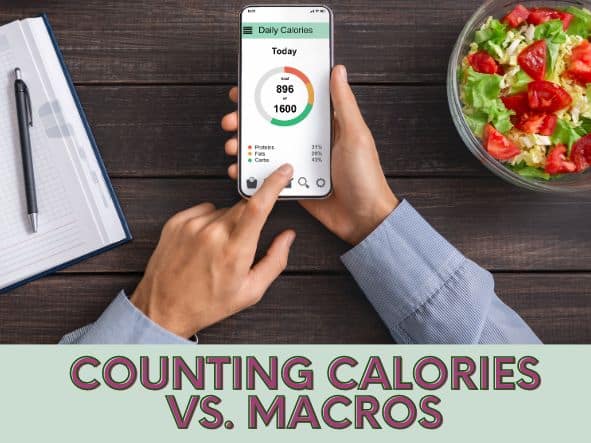People have been counting calories for ages. It’s been the basis of restrictive diets for decades. More recently, dieters are switching the counting macros. What is the difference? Is there one better than the other? Today’s post is all about counting calories vs. macros, and what I think as a non-diet dietitian.
In my beginning years as a dietitian, I can’t tell you how many people just wanted a calorie meal plan. “Just give me a list of foods I can eat that will be 1200 calories” was an all-too-common request.
If you ate a 300-calorie breakfast and 600-calorie lunch, it left you with a measly 300 calories for dinner and snacks. So you felt bad about going over your calorie count, or you were hungry all.the.time.
Later years ushered in counting macros. It seemed to promise more flexibility and an idea that “all foods fit” as long as you hit your macros.
Still, you’re limited. Now you’re weighing your food and using a calculator before you eat. You’ve used up your carbs by noon and you’re stuck eating hard-boiled eggs and chicken breasts the rest of the day.
I’ve written about the carnivore diet, low-carb dieting, and fasting. Folks are looking for a diet that works for them.
While these restrictive diets are polished and “re-branded” to look like something new, they all lead down the same road. Restrict. Binge. Guilt. Repeat. You may spend a lifetime as a chronic dieter.
If you’re new here, welcome. I’m Erin, an anti-diet dietitian who faced major burnout because of the emotional distress my clients had due to dieting.
Today, I’m comparing counting calories vs. macros, and explaining why I’m not a fan of either.
Let’s jump in!
- What are calories?
- What is calorie counting?
- What are macros?
- What is macro tracking?
- Counting calories vs. macros: what’s the difference?
- Why counting calories and macros doesn’t work
- What you can do instead of counting calories or macros
- Ready to give intuitive eating a try? See an anti-diet RD!
- References
Please note: As an Amazon Associate, I earn from qualifying purchases.
What are calories?

First, let’s start with calories. So what is a calorie? It’s the amount of energy in food. That energy is what fuels every action in your body.
From your heartbeat to digestion to physical activity, calories give you the necessary energy to live.
Your body burns energy for fuel, but when it has more than it needs, it will store excess as fat.
The idea is that if you take in more calories than you burn, you’ll gain fat and weight. Of course, your body is not that simple.
Many things go into your metabolism, or how many calories you burn. Your genetics, your gut microbiome, and the type of food you eat impact your energy needs and calorie burn.
What is calorie counting?
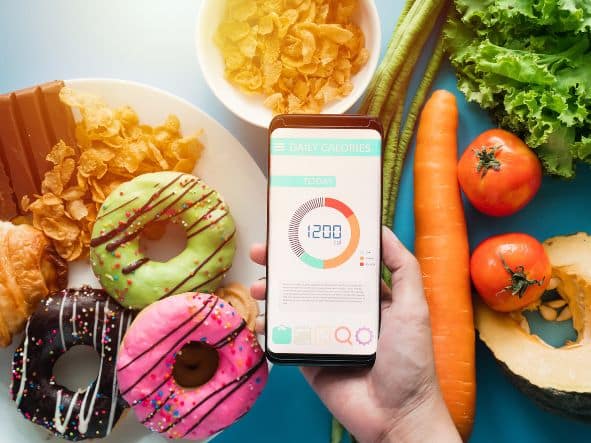
The basis of counting calories is that you have a recommended target and the goal is to come as close to it as possible.
A calorie target is typically based on a generalized calculation that will figure in your age, weight, height, and activity level.
If your goal is weight loss, you set your calorie target lower than the amount of calories that you burn in a day.
From there, you manipulate your diet to meet your target amount of calories. It requires measuring your food and using calorie count data to figure out how many calories you’ve eaten.
People often use apps on their phones to log their food and calculate calorie intake. You may be allowed to eat what you want, as long as you stay within your target range.
With calorie counting, not much attention is paid to the makeup of your calories, or macros.
What are macros?
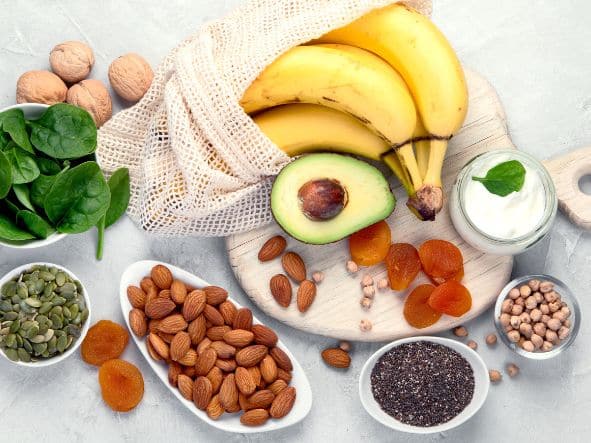
Macros, short for macronutrients are carbohydrates, protein, and fat. The food we eat contains macros. The calories come from somewhere, and vary based on the macros.
Carbohydrates and protein have 4 calories per gram, whereas fat has 9 calories per gram. Each macronutrient has its health benefits.
Carbs are the predominant source of fuel in our diet. Our bodies run off of glucose, which we get from digesting carbohydrates.
Proteins are the building blocks of our body. We need it for muscle and tissue growth and repair. It also helps us feel full after eating.
Lastly, fat helps us absorb nutrients and is essential for brain function and hormone production. Fat also makes our food taste better and helps us feel more satisfied after eating.
What is macro tracking?
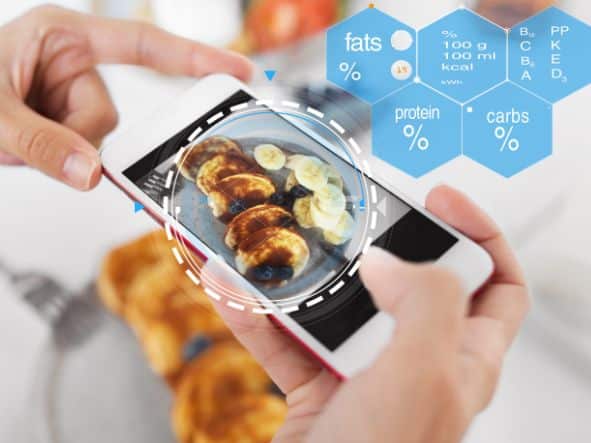
Similar to calorie counting, you are calculating the contents of your food.
When you track your macros, you use a calculator of some kind to figure out the carbs, protein, and fat of every food you eat.
You typically have a target amount of carbs, protein, and fat, measured in grams and percentages. For example, your goal is to eat a diet with 40% carbs, 40% protein, and 20% fat.
If you need to stay at around 1500 calories for weight loss, this is what your daily macro target would be:
- Carbs: 600 calories or 150 grams
- Protein: 600 calories or 150 grams
- Fat: 300 calories or 33 grams
Counting calories vs. macros: what’s the difference?
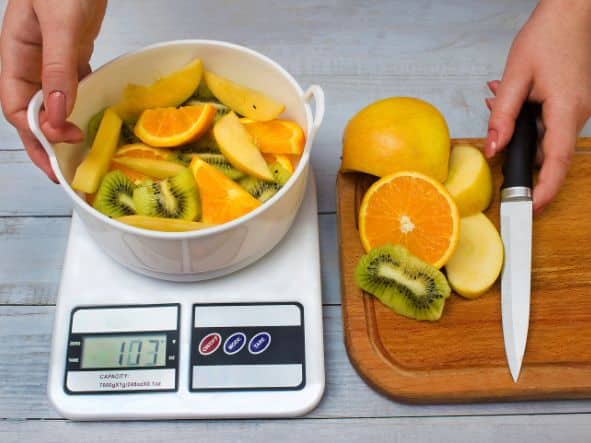
While counting macros is touted as something different than calorie counting, it’s quite similar. The major difference is that you are paying closer attention to the nutritional makeup of your food.
Instead of “blowing” all of your calories on a piece of cheesecake or a meal at a restaurant, you are only eating certain foods that “fit your macros”. Well, that’s the idea, anyway.
They say “all foods fit”. Counting macros suggests more flexibility, but I fail to see how. What if you’re still hungry but you’re out of macros? Or you’re craving a piece of fruit, but you can only eat fat or protein?
Whether counting calories vs. macros, you’re always counting. Both require careful food tracking and calculating to make sure you are coming in at your target calorie and macro goals. Furthermore, macros are calculated based on your calorie target.
Typically, weight loss or body re-composition (more muscle/less fat) are the goals. Therefore your intake is based on a negative energy balance.
In other words, you are trying to take in fewer calories/macros than your body needs to lose fat.
Nutrition-wise, counting macros makes more sense. Our bodies are very complex and nuanced and require a blend of macronutrients to function properly.
Research is stacked in favor of attention to macronutrients. What we eat matters just as much as the amount we eat.
However, I don’t recommend either. Here’s why I don’t like calorie and macro counting as a non-diet dietitian.
Why counting calories and macros doesn’t work

Energy, or calorie restriction, has its benefits. I can’t deny that. In the short term, diets produce weight loss and improvements in glucose. Plus, if we could all just eat less, maybe we’d live longer.
However, if it were that easy, we’d all be able to do it. There wouldn’t be obesity. Everyone would sit comfortably at their goal weight.
Why do we have the health crisis we do if calorie restriction worked?
Notice I said it’s beneficial in the short term? Yep. There’s something about calorie restriction that makes it fail after a while. Metabolisms adapt and your body wants to gain the weight back.
It’s not that you are weak. Your biology is designed to survive in this manner. You are simply hungry and you’re not burning the calories like you used to.
Have you ever restricted your calories so impressively during the day that you came home and ate.all.the.things?
I don’t know a single person who is on a diet that doesn’t fall prey to the restriction and binge cycle. How about you? Do you struggle to stay on track with your calorie or macro count? Vowing to do better on Monday, tomorrow, or next week?
Plus, with calorie or macro restriction, you no longer eat according to your body’s internal cues, but based on how many calories you can eat throughout the day.
You ignore hunger and eat past fullness. It all gets messed up. Not to mention the obsession with food because it is limited or forbidden altogether.
What you can do instead of counting calories or macros

Ready to delete your tracking app? Here are some things that you can do instead of counting and calculating.
- Eat mindfully: We all are guilty. We scarf down our lunch in front of our computers or gobble up popcorn while we watch our favorite show. Instead, designate an area of your house for eating. The kitchen, the dining room. Wherever you choose, make sure you DO NOT have the TV or phone in front of you. I have more mindful eating exercises to help you pay better attention to the food you eat.
- Honor your hunger and fullness: You may have ignored your body’s natural cues when you were counting calories, but you can get them back. When you feel hungry, eat. Hunger isn’t a weakness! Allow yourself to eat until you feel full. Your body has an intricate hormone system that regulates your intake.
- Allow forbidden foods: This may seem counterintuitive to your goals, but the more foods you forbid or restrict, the more likely you will binge on them. Let yourself eat the foods you love, and be mindful and present while you eat them.
- Focus on adding rather than restricting: When you quit dieting, you may give up the nourishing foods that your diet is centered on, like fruits, vegetables, nuts, seeds, and so on. However, when you simply add those foods to your plate, you’ll receive health benefits without restriction.
- Appreciate your body: Dieting often stems from us being discontent with our bodies. Do you frequently body check or have bad body image days? Instead of launching into the usual negative self-talk, try to be grateful for what your body does. Did you wake up? Get out of bed? Give your loved one a hug? Carry your groceries? All of those things we take for granted, but our bodies give us gifts daily. When we’re grateful, we will be able to accept our body for what it is.
Ready to give intuitive eating a try? See an anti-diet RD!

We spend precious years of our lives dieting. Are you ready to eat intuitively and kick dieting to the curb? An anti-diet dietitian can help.
You may have started dieting because of your health. But you can do intuitive eating for diabetes and many other conditions, including PCOS and heart disease.
Food intake can be tailored to enhance your health and meet your unique needs, without restriction or counting.
If you need support on your journey, I’m happy to help. There’s nothing I like better than walking alongside someone as they make peace with food and enjoy the foods they love.
Book a free discovery call to see if my services align with your health goals. I look forward to meeting you!
References
References
- Cuevas-Sierra A, Ramos-Lopez O, Riezu-Boj JI, Milagro FI, Martinez JA. Diet, Gut Microbiota, and Obesity: Links with Host Genetics and Epigenetics and Potential Applications. Adv Nutr. 2019;10(suppl_1):S17-S30. doi:10.1093/advances/nmy078
- Deehan EC.Duar RM.Armet AM.Perez-Muñoz ME.Jin M.Walter J. 2017. Modulation of the Gastrointestinal Microbiome with Nondigestible Fermentable Carbohydrates To Improve Human Health. Microbiol Spectr 5:10.1128/microbiolspec.bad-0019-2017.
- https://doi.org/10.1128/microbiolspec.bad-0019-2017
- Douglas CC, Lawrence JC, Bush NC, Oster RA, Gower BA, Darnell BE. Ability of the Harris Benedict formula to predict energy requirements differs with weight history and ethnicity. Nutr Res. 2007;27(4):194-199. doi:10.1016/j.nutres.2007.01.016
- San-Cristobal R, Navas-Carretero S, Martínez-González MÁ, Ordovas JM, Martínez JA. Contribution of macronutrients to obesity: implications for precision nutrition. Nat Rev Endocrinol. 2020;16(6):305-320. doi:10.1038/s41574-020-0346-8
- Most J, Redman LM. Impact of calorie restriction on energy metabolism in humans. Exp Gerontol. 2020;133:110875. doi:10.1016/j.exger.2020.110875
- Flanagan EW, Most J, Mey JT, Redman LM. Calorie Restriction and Aging in Humans. Annu Rev Nutr. 2020;40:105-133. doi:10.1146/annurev-nutr-122319-034601
- Müller MJ, Enderle J, Pourhassan M, et al. Metabolic adaptation to caloric restriction and subsequent refeeding: the Minnesota Starvation Experiment revisited. Am J Clin Nutr. 2015;102(4):807-819. doi:10.3945/ajcn.115.109173
About the author
Erin is a registered dietitian and diabetes educator with almost 20 years of experience. She specializes in weight-inclusive diabetes care and prevention, intuitive eating, fitness, and women’s health. She works as a consultant and writer in the health and wellness space. Erin is passionate about empowering people to manage their own health and to have peace with food.

